Anatomy of an Era: Troy Branch, Part 3
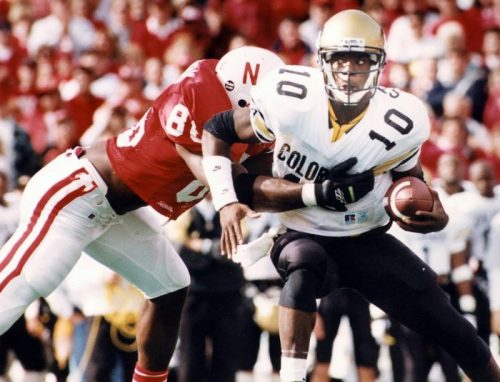
Excerpted from Chapter 92, No Place Like Nebraska: Anatomy of an Era, Vol. 2 by Paul Koch
Anatomy of an Era: Troy Branch, Part 3
Q: So, again, going to back to that ’90 season, what do you think created that ‘folding’, per se? Was there a different mindset at that time?
TB: I just think it was an evolution from the time I got there to that ’93 season, that we were just going to go day by day. It really was, “We are just going to go day by day.”
There was a huge trap game for us -we went out to UCLA- and that was a trap game. They had sprung a trap on us and we had no idea what they were doing. Normally what would happen: when we would start the game I always felt like we were the best-prepared team. We would watch so much film during the week that it was hard for them to throw much at you that you didn’t know was coming. That’s how prepared you were, and that’s the advent of the coaching staff being there so long and being so good and all that other good stuff.
Typically, the way the game went was that by the second, third, fourth drive in the first half -wherever that took you- coaches would start getting dialed in. They would start going, “This is what we’re getting, this is what we’re seeing, this is how we’re going to adjust.” Sometimes it was like, “Hey, remember what we practiced all week? We’re throwing that out. This is what we’re doing.” (laughs) And so the coaches would start getting dialed in, and by halftime they would be able to go in and go over the adjustments they had made during the first half and put in any hard adjustments that needed to be done during halftime, and then you’d be dialed in and you just knew what was going to happen.
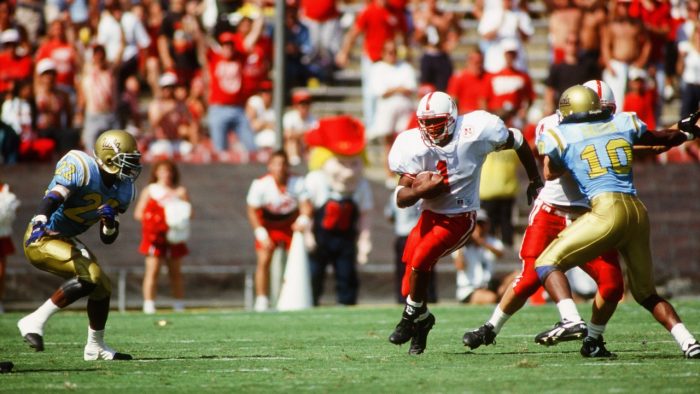
Well, with UCLA we were still adjusting midway through the third quarter -I mean, we had no idea what the hell was going on- that’s why the game was so close. And so it was that kind of game. And actually, Trev Alberts played his ass off that game. That’s when you realized, ‘There may be something to this Alberts kid.’ (laughs) That’s funny, because Trev was my roommate my freshman year.
Q: Really?
TB: Yeah. But once we won the game -and it wasn’t pretty, but we fought hard and no one ever got down, we just stayed together and kept fighting and fighting and fighting- and that’s when the ‘We Refuse to Lose’ came about. That’s when you thought, ‘We might be able to do something here.’
And it just kept going, you know? I remember when it looked like we might get squeezed out because of Florida State and all this other stuff, and then Notre Dame beat Florida State and we were like, “Sweet, we’re gonna get a chance to play,” because West Virginia was undefeated and we were undefeated. And then it looked like they were going to squeeze us out, so we needed Boston College to beat Notre Dame -and I played high school ball against Glenn Foley, who was the starting quarterback for Boston College- so I ended up cheering for him, who was my rival.
I remember cheering for him, all us linebackers sitting at Bleachers Bar & Grill. You would have thought we were Boston College alumni, we were cheering so hard. (laughs) We had gotten out of practice that Saturday and we didn’t know, and if Boston College had beat Notre Dame we would have gone to the Orange Bowl and played Florida State for the de facto national championship, even though West Virginia basically got squeezed out. They probably should have taken West Virginia because we were the only two undefeateds, if I remember correctly.
Q: Yes.
TB: And so we just ended up with Florida State again in Florida: ‘Great. That’s awesome. (sarcastic) We play in the Orange Bowl three times in a row versus Miami once or Florida State twice. Thanks. That’s great.’
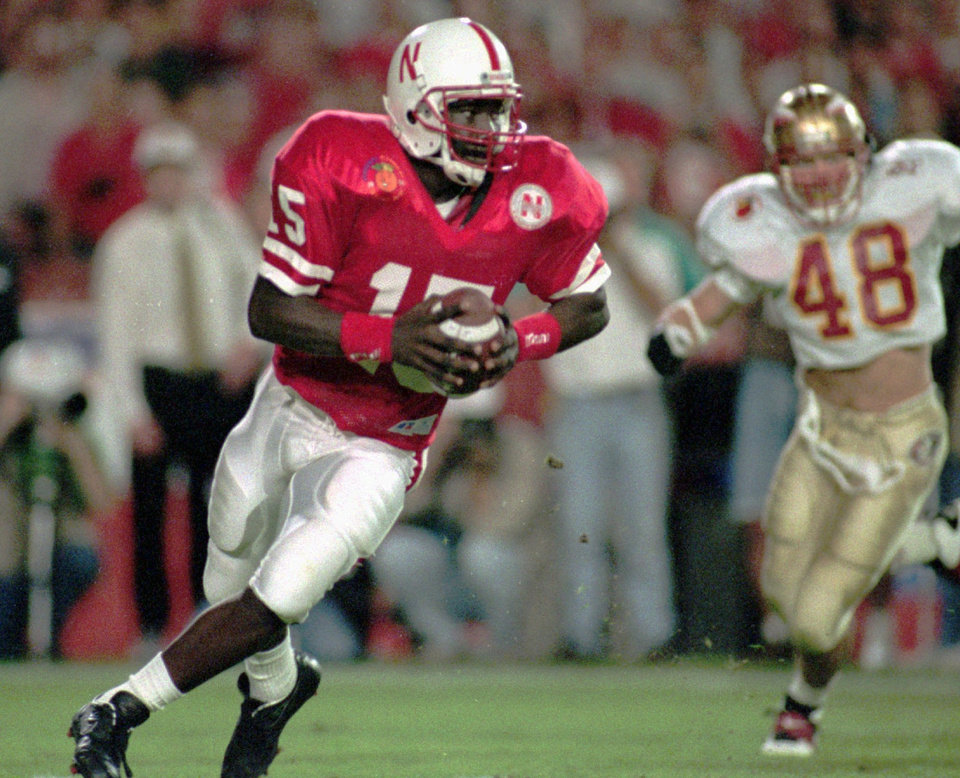
Q: What about that Florida State game sticks out to you, Troy?
TB: Easiest game we ever played in. The game plan was so easy. Florida State -much like Miami back then- they tried to “out-athlete” you. Literally. It was the easiest -from my inside linebacker standpoint- it was the easiest game I ever played in. We had like three responsibilities. I remember Coach Steele coming in early on when we were prepping and saying, “What do you want to do? We could play our normal 60-40, our normal blitz-to-base scenario, or we could play games like Notre Dame did, show a bunch of people and then drop eight or rush eight and play a bunch of games, or we could blitz ‘em.” And we were like, “Well, if we’re going to go down, let’s go down swinging. Let’s blitz ’em. At least we can have fun.” (laughs)
And so, our game plan was really, really simple. We blitzed a ton and -from a linebacker standpoint- when we blitzed it meant a lot of Eleven Robber-type coverage, which basically meant that you closed on the closest back to your side. And if it’s a run and they hand it to him you can go make the tackle. And if it’s not, you need to play inside out and pray they don’t look your way. (laughs) And that was pretty much it.
And we had certain rules on pass coverage: “Never let a Florida State receiver cross your face unmolested.” We worked for months: “No one crosses your face without getting hit. Period.” And it was a really simple game plan. Really simple.
Q: And if you had a chance to do anything over in that game, would you?
TB: If I had to do it over again? I would have begged Coach Osborne to start running the ball earlier in the second half, really just committing to just hammering it down their throats. Because Calvin Jones’ foot got hurt, and then a young freshman by the name of Lawrence Phillips -I don’t know if people remember– scored that go-ahead touchdown. It’s my belief that if we would have committed to hammering the ball down their throat just a little bit earlier we could have broke their back and it would have never come down to one possession. But you know what? Coach Osborne has forgotten more football than I’ll ever know, so… (laughs)
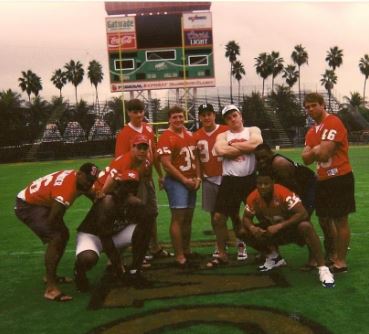
Q: Hey, I was talking to Jon Pedersen last week and he said that late field goal attempt was blocked…
TB: I don’t know if it looked blocked to me. I thought it was a shank. Pete broke his ankle that year… who was snapping back then? But anyway, it just looked like he tried to overkick it and, snap, it was almost like a snap-hook to the left.
Q: He swears that watching from the sidelines somebody jumped up super-high and tipped it…
TB: No, I think it was the snap-hook. Of course, I’ve never watched that game all the way through. Never watched it. And don’t worry, I don’t want to. No. Not me.
Q: I sent Corey Dixon a copy of the game…
TB: So he could see the clip again? The phantom clip? And the non-fumble call?
Q: I talked to Toby Wright last week and he talked about that goal line stop, too.
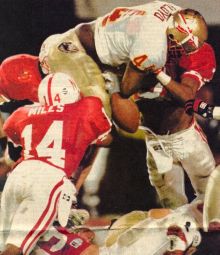
TB: Yeah, I think it was Toby hit him and Mike (Anderson) recovered it. Yeah, it was… I don’t know. I don’t know what to say. We kicked their butts, it’s no question. It was just one of those deals where at the end of the game you say, ‘We won this game, but they get the hardware.’
Q: So, was there anyone behind the scenes -someone worth spotlighting- who played a crucial role in your time there and helped make the team what it was?
TB: Well, they get recognized: but the academic support staff. And Keith Zimmer in particular. They become your confidant, they become your shoulder to cry on, they become your mom, your dad. They have as much contact with you as the coaches do and in some cases more. So they have a lot to say and a lot to do with the way guys turn out, because what people forget is that the players are living a life outside of football. And boy, when school’s not going right -you don’t think it would- but it just boils over into other parts of guy’s lives. It just makes it difficult.
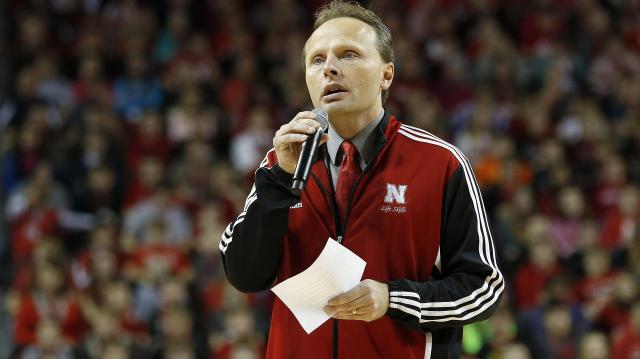
Keith Zimmer: Life Skills guru
Q: What was your most difficult time?
TB: Probably, I wasn’t getting the time that I thought I deserved, and then academically -I never struggled academically- but everything becomes a grind. You want more time, you want to play and be recognized, but your professors, they don’t care. You know? “Son, I really don’t care that you’re having a bad time at this point. Work needs to be done and you have to do it.”
You have to compartmentalize that stuff, and I think the average fan can’t overestimate what it takes to compartmentalize those lives and do them both well. You have to be able to go: ‘Okay, I know my girlfriend… we may be arguing about something and I’m not playing well, or I’m not getting the time I think I deserve and something may be going on back home that I can’t really do anything about, but it worries me and it’s on my mind… but I’m going to go ahead and focus on this test right now.‘ (laughs)
The average fan? They don’t necessarily get that piece. I think they understand that stuff in life happens, but I don’t think they get the piece about the fact that that stuff is happening to you and everyone else and, ‘Oh, by the way, there’s this thing that you do that the entire state is going to be focused on in another seven days.’
Q: I can empathize with that. And what you said really puts a human element-spin on the process. From my perspective, if you happened to be a senior on the University of Nebraska football team, you are in essence a warrior, a survivor already… you had to possess incredibly strong character and drive.
TB: Yeah, you’ve seen some stuff. (laughs) As much as you try to tell people, I don’t know if they’ll ever understand it.

Available on Amazon.com
Q: And even if they don’t, maybe the best they can do is still support the young men in any way they can?
TB: That’s the thing. That’s the thing that burns me up to his day, is when you see, for lack of a better word: fair weather-type fans. You just want to go, ‘Yeah, you know what? This kid’s dream was to wake up today and piss off 80,000 people. (laughs) That’s what he was aiming for today when he woke up. That’s what he was going after.’ (laughing)
Q: You have a unique way of putting it black and white, Troy. (laughs)
TB: Yeah, you’ll have to forgive my language. I can’t help it. But it’s the truth. It’s like, ‘Come on, man. Just get a grip. He didn’t wake up and go, “I can’t wait (to play badly and ruin everyone’s day)…” (laughing)
Q: As far as changing the culture around there, was it the team mottos? The slogans, the Unity Council, anything else play a big role?
TB: I think the players really did get more of a say in what was going on. I think Coach Osborne was receptive to that piece. But I also think it was an evolution, whether it was the type of players or what it was. I can’t say we practiced any harder or less hard than other teams that came before us, but there was just something about that group where I just felt goes back to the workman-like ethos. Maybe it was that we didn’t have a bunch of stars and guys just came and worked. I mean, outside of Trev, there wasn’t a whole bunch of star power that we knew of. Now, of course, there was plenty of star power that we now know what was to come…
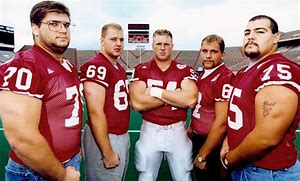
Q: But some of those guys were getting the hell beat out of them on scout team at that time, right?
TB: Yeah, yeah. I remember Eric Anderson, Aaron Taylor. All those guys were on scout team when I was a senior. They weren’t the Pipeline yet, but you just had on that ’93 team… we were just workman-like. That’s the best way I can describe it. Guys just came to work. And I can remember that year there just wasn’t a whole lot of hollering. The coaches were just able to go, “Okay, run that play. That’s the way we want to do it. Alright, run that play again, we want to take a look at it.” It was just very, very businesslike. And that’s because guys came, practiced hard, and went about their business and took care of business. It didn’t look pretty all the time, but that’s the way it was.
Q: “That’s football.”
TB: Yeah. I had a blast my senior year. I had so much fun. So much fun.
Q: So what did you take for a class-load your senior year, after you had already graduated?
TB: Well, I graduated in four years. So both my junior year and senior year I was carrying sixteen hours each semester. But my last year playing, my athletic senior year? No, no, no, Troy had his degree. (laughs) I was an unclassified grad student, which meant I only had to take nine hours, and I wasn’t exactly stretching my mental capacity that last year. (laughs) I was, ‘You know what, I graduated in four years. That’s better than most. I’m going to kick back and enjoy these last moments.’
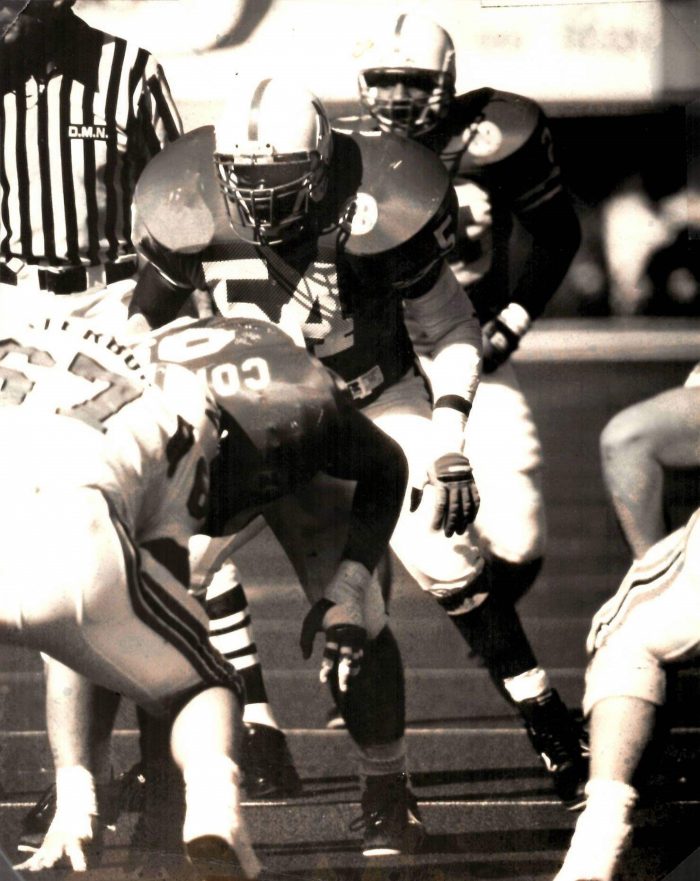
Q: Do you recall what classes you took?
TB: Oh, what did I take that year? Did I take bowling that year? I took a philosophy or religion class -I was a Philosophy minor- but I was like, ‘Nah, that’s just too much work for me at this point.’ (laughs) I wanted to get up and go to class and then go to the arcade until practice starts. But I had my degree, a Bachelor of Arts in History. I was planning to go to law school, but I just wasn’t planning on working hard those last six months. (laughs)
Q: Well, Troy, I’ve asked about every question I can think of. Any parting shots?
TB: That ’93 team was special to me. I just remember it fondly. We did everything we could to win the national title. We just fell short. Everything but the scoreboard. Everything but the scoreboard. And when you look, that’s what matters.
Q: So where were you when the team actually won it the next year?
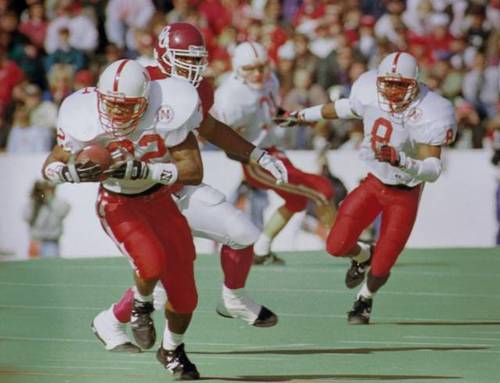
TB: I was in New Jersey. I don’t know if Mike told you that part of it, but I was in New Jersey for the first time in five years and everybody was, “The U, the U, the U! You guys are gonna get blown out again!” And I was like, ‘We’ll see.’ And I remember calling Mike Anderson after the game and I was crying on the phone and was like, ‘Can you believe they just won the national title!? Oh, my God!’ I thought about all those guys.
You were just happy for them. You were sad, too, because you knew that our ’93 team was going to be a footnote in history. But also, you were happy. And this is me -I’m more philosophical- we were going to be a footnote in history, but you were still so happy for the guys you played with. They were going to be national champions. And I remember thinking of Phil Ellis and Doug Colman and John Hesse and all those guys who were younger than us, that they had just won the national title.
Q: And Ed, too?
TB: And Ed, too. Yeah, that’s right. I thought about Ed, too. (laughs)
End conversation.
Honestly, I don’t quite know where to begin with this conversation’s summary. It was so rich on so many levels, with Troy’s touching on the precarious balance of being an college athlete, a student far from the comforts of home, interpersonal issues abounding, trying one’s best and not quite measuring up, failing to gain a foothold into his coach’s inner sanctum of acceptance. We’ve heard his story or something like it from more than a few of his peers and I think it’s safe to say that even Linebackers Coach Kevin Steele learned a lesson or two in the practice of his bedside manner, with the pupils instructing the master just this once. Pride cometh before the fall, and it was refreshing to relive that moment in team history when humility prevailed, when a sense of understanding grudgingly gained turned into an unforgettable final year, a split second from a championship year. The lesson here? Not all teachable moments are relegated to only the classroom.
Troy spoke of ‘the process’ and the prevailing mindset of those teams: “..play every game like it’s the only game… And if you can do that, what you find out is that you are playing against yourself, you are playing against what you believe is your max(imum) self.” You’ve no idea how many times I’ll turn off a televised game in disgust upon sensing, feeling, perceiving, intuitively knowing the team has not played up to its full potential, but instead have played down to its adversary. As sure as the sun setting and clockwork, the condition occurs in all sports and human endeavors. It’s a stumbling stone for the weaker of wills. Playing Up vs. Playing Down: I happen to think the difference between the two trains of thought is a great chasm separating the merely good teams from the truly great ones. These guys had that mindset, that team philosophy, and in the process are cemented in history for their resultant achievements.
Troy linked it up by talking about the role of goals and what their attainment or lack thereof signified: “And what I realized, we had all the goals -20 to 25 goals- all these esoteric numbers… And what you found out is that as you achieved more of those goals you become more of a complete team… if you can get teams to focus that way, those are the teams that end up special.” We both know how special that can be, specifically with a leader who had the “ability to get people to focus in the moment.” The key they took away from enduring “the grind” for the sake of present payoffs was the necessity of their possessing that day-to-day, workmanlike focus.
Lastly, he brought to the forefront of my mind one of history’s greatest, most tenacious and resilient explorers when he mentioned: “..(on) any great team, I realized, you have to find something bigger than yourself. That’s when you’re a good team: when you’re playing for something bigger than yourself.” One of my all-time favorite historical documentaries is the 2000 movie, The Endurance, a retelling of Sir Ernest Shackleton’s doomed 1914-1916 effort to conquer Antarctica and the resulting clash for his team of men’s survival against overwhelming odds. The men on that expedition volunteered for a most brutal, horrible and harrowing of adventures, the premise of the expedition most foundationally being this: brave young men throughout the ages have sought out rare occasion to do, to dare great things, to achieve heights and accomplishments and reach conclusions far beyond the pale of an otherwise bland, normal and otherwise hum-drum life. And if, in doing so meant laying one’s delicate neck in the guillotine’s figurative lunette for a swipe at immortality? Then…? Well, then so be it. No guts, no glory: “…if you truly want a ‘team,’ that team has to believe in something bigger than itself. When you do that it’s easier to sacrifice, to make those personal sacrifices to allow the entire team to be better, not just you personally.” There was no I in this team: Just a lot of m-e-a-t (muscle) and ‘m-a-t-e’s (brothers) pushing the limits as they made their ascent.
Notable quote #2:
Troy Branch on the motivation arising from the team concept: “I’m playing not so much for me, but I can’t let that guy down and then look him in the eye when we go into the film room on Monday.”
Copyright @ 2013 Thermopylae Press. All Rights Reserved.
Photo Credits : Unknown Original Sources/Updates Welcomed
Author assumes no responsibility for interviewee errors or misstatements of fact.